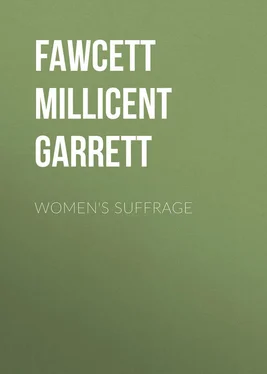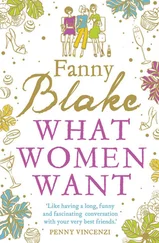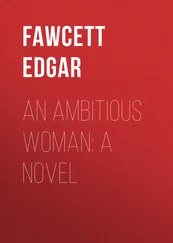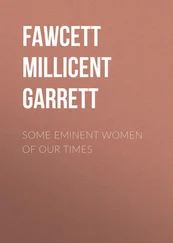Millicent Fawcett - Women's Suffrage
Здесь есть возможность читать онлайн «Millicent Fawcett - Women's Suffrage» — ознакомительный отрывок электронной книги совершенно бесплатно, а после прочтения отрывка купить полную версию. В некоторых случаях можно слушать аудио, скачать через торрент в формате fb2 и присутствует краткое содержание. Издательство: Иностранный паблик, Жанр: foreign_antique, foreign_prose, на английском языке. Описание произведения, (предисловие) а так же отзывы посетителей доступны на портале библиотеки ЛибКат.
- Название:Women's Suffrage
- Автор:
- Издательство:Иностранный паблик
- Жанр:
- Год:неизвестен
- ISBN:нет данных
- Рейтинг книги:3 / 5. Голосов: 1
-
Избранное:Добавить в избранное
- Отзывы:
-
Ваша оценка:
- 60
- 1
- 2
- 3
- 4
- 5
Women's Suffrage: краткое содержание, описание и аннотация
Предлагаем к чтению аннотацию, описание, краткое содержание или предисловие (зависит от того, что написал сам автор книги «Women's Suffrage»). Если вы не нашли необходимую информацию о книге — напишите в комментариях, мы постараемся отыскать её.
Women's Suffrage — читать онлайн ознакомительный отрывок
Ниже представлен текст книги, разбитый по страницам. Система сохранения места последней прочитанной страницы, позволяет с удобством читать онлайн бесплатно книгу «Women's Suffrage», без необходимости каждый раз заново искать на чём Вы остановились. Поставьте закладку, и сможете в любой момент перейти на страницу, на которой закончили чтение.
Интервал:
Закладка:
Dame Millicent Garrett Fawcett
Women's Suffrage / A Short History of a Great Movement
CHAPTER I
THE BEGINNINGS
We suffragists have no cause to be ashamed of the founders of our movement —
"In everything we're sprung
Of earth's first blood, have titles manifold."
Mary Wollstonecraft [1] Vindication of the Rights of Women , published in 1792.
started the demand of women for political liberty in England, Condorcet in France, [2] See Le vote des Femmes , pp. 16-22, par Ferdinand Buisson, Député de la Seine et Président de la Commission du Suffrage Universelle. Condorcet had a predecessor in Mademoiselle Jars de Gournay, the friend of Montaigne. See Miss E. Sichel's Michel de Montaigne , p. 137.
and the heroic group of anti-slavery agitators in the United States. It is true that Horace Walpole called Mary Wollstonecraft "a hyena in petticoats." But this proves nothing except his profound ignorance of her character and aims. Have we not in our own time heard the ladies who first joined the Primrose League described by an excited politician as "filthy witches"? The epithet of course was as totally removed from any relation to the facts as that which Horace Walpole applied to Mary Wollstonecraft. William Godwin's touching memoir of his wife, Mr. Kegan Paul's William Godwin: his Friends and Contemporaries , and Mrs. Pennell's Biography show Mary Wollstonecraft as a woman of exceptionally pure and exalted character. Her sharp wits had been sharpened by every sort of personal misfortune; they enabled her to pierce through all shams and pretences, but they never caused her to lower her high sense of duty; they never embittered her or caused her to waver in her allegiance to the pieties of domestic life. Her husband wrote of her soon after her death, "She was a worshipper of domestic life." If there is anything in appearance, her face in the picture in the National Portrait Gallery speaks for her. Southey wrote of her, that of all the lions of the day whom he had seen "her face was the best, infinitely the best."
The torch which was lighted by Mary Wollstonecraft was never afterwards extinguished; there are glimpses of its light in the poems of her son-in-law Shelley. The frequent references to the principle of equality between men and women in the "Revolt of Islam" will occur to every reader.
In 1810 Sydney Smith, in the Edinburgh Review , wrote one of the most brilliant and witty articles which even he ever penned in defence of an extension of the means of a sound education to women.
In 1813 Mrs. Elizabeth Fry began to visit prisoners in Newgate, and shocked those who, citing the parrot cry "woman's place is home," thought a good woman had no duties outside its walls. She had children of her own, but this did not shut her heart to the wretched waifs for whom she founded a school in prison. A little after this England began to be stirred by the agitation which resulted in the passing of the Reform Bill of 1832. It is one of life's little ironies that James Mill, the founder of the Philosophical Radicals, and the father of John Stuart Mill, who laid the foundation of the modern suffrage movement, was among those who, in the early nineteenth century, justified the exclusion of women from all political rights. In an Essay on "Government" published in 1823 as an appendix to the fifth edition of the Encyclopædia Britannica , he dismissed in a sentence all claim of women to share in the benefits and protection of representative government, stating that their interests were sufficiently protected by the enfranchisement of their husbands and fathers. It is true that this did not pass unchallenged; a book in reply was published (1825) by William Thomson. This book had a preface by Mrs. Wheeler, at whose instigation it was written. [3] Helen Blackburn's Record of Women's Suffrage , also Women in English Life , by Miss Georgina Hill. Mrs. Wheeler's daughter Rosina, married Mr. Lytton Bulwer, afterwards the first Lord Lytton. The present Earl of Lytton is thus the great-grandson of the lady who prompted the reply to James Mill's article referred to in the text.
The Reform Movement was agitating the whole country at this period, and political excitement led to political riots, burning of buildings, and general orgies of massacre and destruction. The Government of the day had their share in the blunders and stupidities which led to these crimes, and in none were these qualities more conspicuous than in the riot at Manchester, which came to be known as the Peterloo Massacre in August 1819, in which six people were killed and about thirty seriously injured.
What connects it with the subject of these pages has already been hinted at. Women as well as men had been ridden down by the cavalry; they were present at the meeting not merely as spectators, but as taking an active part in the Reform Movement. A picture of the Peterloo Massacre, now in the Manchester Reform Club, is dedicated to "Henry Hunt, Esq., the chairman of the meeting and to the Female Reformers of Manchester and the adjacent towns who were exposed to and suffered from the wanton and furious attack made on them by that brutal armed force, the Manchester and Cheshire Yeomanry Cavalry." The picture represents women in every part of the fray, and certainly taking their share in its horrors. In the many descriptions of the event, no word of reprobation has come to my notice of the women who were taking part in the meeting; they were neither "hyenas" nor "witches," but patriotic women helping their husbands and brothers to obtain political liberty; in a word, they were working for men and not for themselves, and this made an immense difference in the judgment meted out to them. However, it is quite clear that even as long ago as 1819 the notion that women have nothing to do with politics was in practice rejected by the political common-sense of Englishmen. No one doubted that women were, and ought to be, deeply interested in what concerned the political well-being of their country.
Some political antiquarians in this country have expressed their conviction that in early times when the institution of feudalism was the strongest political force in England, women exercised electoral rights in those cases where they were entitled as landowners or as freewomen of certain towns to do so. [4] This view has also been supported in France, see Le vote des Femmes , by Ferdinand Buisson, for evidence of women having in ancient times voted and sat in the Parlements of France. Taine also mentions the Countess of Perigord sitting in the États of her province prior to the Revolution ( Les Origines de la France Contemporaire , par H. Taine, vol. i. p. 104).
This view has been combated by other authorities, and has not been accepted in the law courts, where special emphasis has been laid on the fact that no authentic case of a woman having actually cast a vote, as of right, in a Parliamentary election can be produced. The claim that in ancient times women did exercise the franchise, whether capable of being established or not, certainly does not deserve to be dismissed as in itself absurd and incredible. I believe it has been called by some anti-suffragists "an impudent imposture," in the most approved style of the "what-I-know-not-is-not-knowledge" pedant. Whatever it may be, it is not this. In a book published in 1911, [5] Annals of a Yorkshire House , vol. ii. p. 319.
there is a passage which goes far to prove that even as late as 1807 the right of women possessing the necessary legal qualification to vote in Parliamentary elections was recognised as being in existence. One of the Spencer Stanhopes was a candidate during the general election of 1807, and Mrs. Spencer Stanhope writes to her son, John, that her husband's party was so certain of success that they had announced that their women folk need not vote. "Your father was at Wakefield canvassing yesterday… They determined not to admit the ladies to vote, which is extraordinary and very hard, considering how few privileges we poor females have. Should it come to a very close struggle, I daresay they will then call upon the ladies, and in that case every self-respecting woman should most certainly refuse her assistance."
Интервал:
Закладка:
Похожие книги на «Women's Suffrage»
Представляем Вашему вниманию похожие книги на «Women's Suffrage» списком для выбора. Мы отобрали схожую по названию и смыслу литературу в надежде предоставить читателям больше вариантов отыскать новые, интересные, ещё непрочитанные произведения.
Обсуждение, отзывы о книге «Women's Suffrage» и просто собственные мнения читателей. Оставьте ваши комментарии, напишите, что Вы думаете о произведении, его смысле или главных героях. Укажите что конкретно понравилось, а что нет, и почему Вы так считаете.












